|
|
| |
| EVENTS |
|
|
> Trade across LOC is a good tool to enhance inter-dependence that could lead towards Indo-Pak conflict resolution
|
|
|
|
| |
Islamabad; February 08; At the launching session of Discussion Papers on Jammu and Kashmir: Trade Across the Line of Control (LoC), panellists believed that trade and commerce across the line of control can minimize the tension and it could enhance inter- dependence on each other which could lead towards Pak-India conflict resolution. Panellists were of the view that trade across LOC is the only confidence-building measure (CBM) between Pakistan and India which directly benefits the Kashmiri people. Experts believed that people-to-people contact and trade has contributed positively on both sides of Kashmir. |
|
| |
Honourable Shahzada Mohiuddin, MNA, Chairman, National Assembly Standing Committee on Kashmir Affairs and Gilgit-Baltistan, was the Chief Guest at the session. Dr. Hasan Askari Rizvi, Political & Defence Analyst, Mr. Arif Kamal, Former Ambassador, Ms. Ayesha Saeed, Faculty Member, NUST Business School, Mr. Zulfiqar Abbasi, President J&K Joint Chamber of Commerce and Industries, Mr. Tasneem Noorani, Former Federal Secretary, Interior and Commerce, Mr. Jonathan Cohen, Director Programmes, Conciliation Resource, United Kingdom and Mr. Ahmed Bilal Mehboob, Executive Director PILDAT, spoke on the occasion. Parliamentarians, civil society representatives, academicians, intellectuals, diplomats and media representatives were present at the Launching Ceremony.
|
|
| |
Shahzada Mohiuddin, while speaking on the occasion, was of the opinion that people of both sides of LoC are quite happy after the start the Intra Kashmir trade and it has provided an opportunity to the people across LoC to meet each other. He was of the opinion that Plebiscite is the need of the hour which could enable both sides to prosper. He asked the authors to send these Discussion Papers to Pakistan�s Federal Ministry of Kashmir Affairs. |
|
| |
Dr. Hassan-Askari Rizvi said that a practical effort is being made on how to engage in conflict management and conflict resolution. He was of the view that if trade and commerce increase, tension and conflict can be minimized. This creates stakeholders on both sides and allows greater human interaction on the both sides of the LoC .He said that the papers have tried to review the movement of goods and people and have useful information specially on trade and its impact. The Discussion Paper also identifies problems and obstacles |
|
| |
Ms. Ayesha Saeed, and Mr. Arif Kamal, the authors of the papers, presented their views. They were of the opinion that Intra Kashmir trade is not just another CBM, it is in fact the first-ever CBM which directly benefits the people of Jammu and Kashmir. Inter-dependence rather inter-connection could benefit people across the LoC. They believed that both sides should benefit equally from the trade. Logistical and other hindrances could harm the Intra-Kashmir trade. They were of the opinion that it is a long overdue step in the right direction to ease the suffering of the people on the both sides of the LoC. |
|
| |
Mr. Zulfiqar Abbasi, while presenting his perspective, said that conflict of Kashmir turned the paradise on earth into hell with extreme poverty, untapped economical potential and dependency on others. He pointed out hindrances and problems faced by the traders. Trade is restricted only to 21 items and two days a week. He believed that hopes were high but on ground it is too little for economic revival of the people of the area. He demand that Multi entry trade pass of at least two year should be issued to traders on both sides. |
|
| |
Mr. Tasneem Noorani in his remarks said that intra-Kashmir trade has insignificant economical benefits because it is very much restricted. He believed that allowing and then restricting everything is of no use to Pakistan and India and both sides must re-visit their policy on intra-LoC trade. |
|
| |
Mr. Jonathan Cohen, while expressing his views, said that the main objective behind the Discussion Papers has been to give authors from either side an opportunity to express their feelings on the effort of Intra-Kashmir trade. In many conflicts, economics has played an important role in achieving conflict resolution. He said that we cannot separate economic and peace process. CBMs do not resolve conflicts but create an environment for conflict resolution. |
|
| |
Earlier Mr. Ahmed Bilal Mehboob said that the PILDAT effort to partner with the CR in launching these papers is to highlight the benefits and problems in trade across the LoC. |
|
| |
|
|
| |

|
|
| |
|
|
| |

|
|
| |
|
|
| |
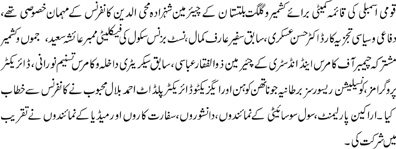
|
|
| |
|
|
| |

|
|
| |
|
|
| |

|
|
| |
|
|
| |

|
|
| |
|
|
| |

|
|
| |
|
|
| |

|
|
| |
|
|
| |

|
|
| |
|
|
| |

|
|
| |
|
|
| |
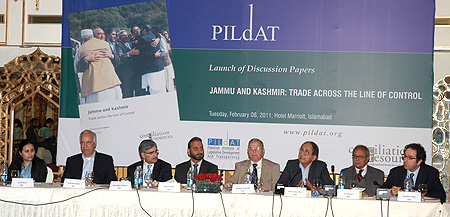
|
|
| |
|
|
| |
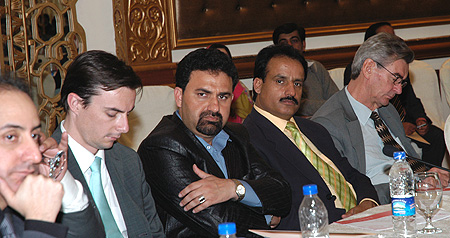
|
|
| |
|
|
| |
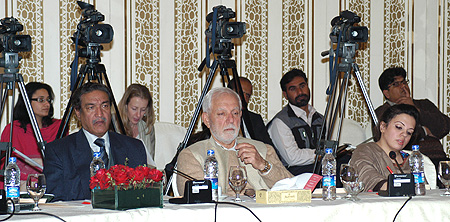
|
|
| |
|
|
| |
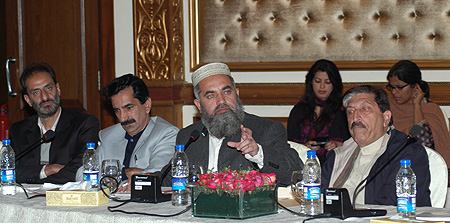
|
|
| |
|
|
| |

|
|
|
|
|
|
|
|
|